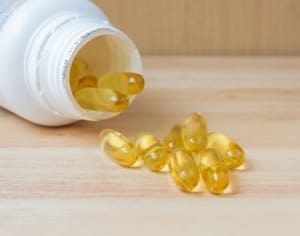Vitamin D3 is vital for a healthy immune system, reducing inflammation and the growth and repair of cells. It is one of the most readily available vitamins to us, as we obtain vitamin D3 through direct exposure to the sun’s UVB rays. Vitamin D is important for bone structure and preventing degenerative diseases such as osteoporosis.
It is estimated up to 54 million Americans over the age of 50 suffer from osteoporosis and low bone mass (2014 data). It is predicted that by the year 2030 this figure will increase to over 64 million. As osteoporosis is found to be present in mostly over 50’s who spend less time in the sun, it is vital we take preventative steps early on in life to strengthen our bones. Vitamin D is important for healthy, strong bones as it promotes the absorption of the minerals calcium and phosphate. A deficiency in vitamin D greatly increases the occurrence of bone fractures.
osteoporosis and low bone mass (2014 data). It is predicted that by the year 2030 this figure will increase to over 64 million. As osteoporosis is found to be present in mostly over 50’s who spend less time in the sun, it is vital we take preventative steps early on in life to strengthen our bones. Vitamin D is important for healthy, strong bones as it promotes the absorption of the minerals calcium and phosphate. A deficiency in vitamin D greatly increases the occurrence of bone fractures.
Sources of vitamin D
Your body can only produce vitamin D in the presence of sunlight. Aside from coming back from vacation with a glowing tan, being exposed to greater levels of vitamin D3 is one of the reasons many people feel happier, have fewer skin problems and less stress after spending time in a tropical destination. Vitamin D is only formed from the direct exposure of UVB rays specifically. Exposure to the sun’s rays indoors blocks out the UVB rays as it cannot penetrate glass. Further, exposure to sunlight indoors or through your car window only allows damaging UVA rays to penetrate through to your skin.
There are not many food sources that naturally contain vitamin D, only small traces are present in cheese, egg yolks, mushrooms and the flesh of fatty fish-tuna, mackerel or salmon. It is for this reason that many large companies have fortified vitamin D added to their foods, such as cereal, margarine and yoghurt.
It can be difficult for vegans and those that follow dairy free or animal- free diets to obtain sufficient levels of vitamin D. Vitamin D3 is available in the form of supplements. It has also been found that those with darker skin are not able to produce levels of vitamin D as sufficiently as those with fairer skin. Having the option to take vitamin D capsules orally is a good solution for the elderly who spend less time in the sun. Also when we age, our skin cannot produce vitamin D as efficiently, therefore it is important that the recommended daily intake is reached as the elderly are more prone to falls and fracturing weak bones.
free diets to obtain sufficient levels of vitamin D. Vitamin D3 is available in the form of supplements. It has also been found that those with darker skin are not able to produce levels of vitamin D as sufficiently as those with fairer skin. Having the option to take vitamin D capsules orally is a good solution for the elderly who spend less time in the sun. Also when we age, our skin cannot produce vitamin D as efficiently, therefore it is important that the recommended daily intake is reached as the elderly are more prone to falls and fracturing weak bones.
Daily intakes
While exposure times to sunlight varies with factors such as age, application of sunscreen, time of day, season and skin type, the recommended daily intake of vitamin D is at least 400IU (capsule form). However, some people who are suffering from chronic illness are shown to benefit from 2000 -5000 IU daily.
Resources: Statistics osteoporosis www.nof.org/news/2948
Vitamin D fact sheet: www.ods.od.nih.gov/factsheets/VitaminD-HealthProfessional/
You can learn more about how to overcome disease and reach optimum states of health using my Alpha Healing System. This is a 5 step, 11 week program with my very best methods put into one complete system.
Each step is designed to build on the other, as it systematically programs you to overcome any personal challenges and elevates your mind to a state of optimum self healing.
Discover the number one risk factor for chronic disease and exactly how to fix it here: http://www.AlphaHealingSystem.com/Discover




Leave A Comment